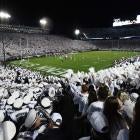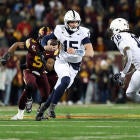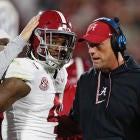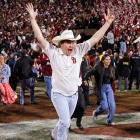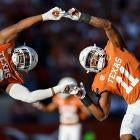A peer called Penn State coach James Franklin the other day asking another head scratcher in the ongoing return-to-play discussion: What if the 14 schools that make up the Big Ten are unable open their camps or seasons simultaneously?
"That's what he was kind of recommending, that the Big Ten kind of [has to] come out and say, 'Hey, this needs to be kind of consistent across the Big Ten,'" Franklin told reporters during a Wednesday conference call. "I said, 'I just don't think that's going to work. It either needs to be national or not at all.'"
Good luck with that. The coronavirus doesn't observe state lines or starting dates, and consistency is not the country's strong suit at this point in the return-to-play discussion.
Twenty-four states have begun a partial reopening, according to the New York Times. Another five are reopening soon.
Notre Dame athletic director Jack Swarbrick cast doubt on the future, saying Tuesday there is a "significant chance" the 10 FBS conferences don't start play simultaneously.
Against that backdrop are the game's stakeholders, who are considering almost any scenario to get football played as soon as possible.
They have considered a late start to the season, a split-semester season, a spring season … even no season.
Coaches being coaches, though, their conversation considers competitive balance. Who is getting an advantage in the new normal?
Franklin went on to call for the NCAA to make "sure conferences aren't opening earlier than they should." He believes conferences should begin play simultaneously, even if all of their member teams are not able to do so.
"For example, with the Big Ten, say we have two or three schools at the end of the season who are part of the playoff conversation," he said. "The schools that we're competing against in other conferences, [let's assume] they were able to open before we were, and the Big Ten held back certain schools. … It's not ideal. ...
"Arizona is going to be very different than New Jersey. Maryland is different than Florida. I don't think you're going to like it. I don't think people are going to be happy about it, but I think, in reality, I don't see how you're going to be able to hold up 10 or 12 schools in one conference from two states that are opening up a month later."
Franklin's conversation took the present uncertainty a step further. What if schools within a conference don't start their seasons collectively?
"Say you have six schools in your conference or eight schools in your conference that all are able to open," Franklin said, "and there are one or two that can't. Are you going to penalize all these schools not being able to reopen?"
Franklin added: "I'm a believer in science. I'm a believer in medicine in listening to the experts. Our decisions have to be based on that. … Science can be proven, right?"








